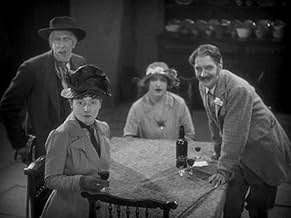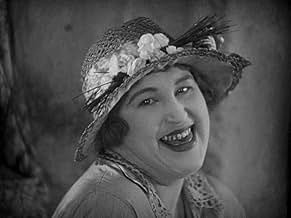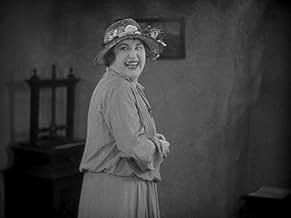IMDb-BEWERTUNG
5,8/10
3328
IHRE BEWERTUNG
Füge eine Handlung in deiner Sprache hinzuAfter his daughter weds, a middle-aged widower with a profitable farm decides to remarry, but he has problems choosing a suitable mate.After his daughter weds, a middle-aged widower with a profitable farm decides to remarry, but he has problems choosing a suitable mate.After his daughter weds, a middle-aged widower with a profitable farm decides to remarry, but he has problems choosing a suitable mate.
Lillian Hall-Davis
- Araminta Dench - Sweetland's Housekeeper
- (as Lilian Hall-Davis)
Diana Napier
- Sibley Sweetland
- (as Mollie Ellis)
Harry Terry
- Guest at Wedding Breakfast
- (Nicht genannt)
- …
Empfohlene Bewertungen
The first half is rather slow, but keep going - it's definitely worth it. The humour in Hitchcock's films is generally based around great character actors (e.g. Jessie Royce Landis in To Catch a Thief and North by NorthWest), and here not one of the actors disappoints. Lillian Hall Davis has a better part in the Ring (also 1928 - Gordon Harker is again very amusing in it too), but is lovely in this film. Sound would have added nothing. My 8-year old daughter was apprehensive about watching a silent film, but once things started to get going in the second half, was hooked.
Hitchcock referred to it in later years as one of his "photographed plays", but the action occurs in several locations, so is nowhere near as constrained as many of his films (plays or not). In fact, even though the location shots are few and far between, they really give this film a non-studio feel.
All of Hitchcock's films are notable for their visual storytelling (look at the initial scene-setting in Rear Window that speaks volumes without a single word being uttered), and it is interesting to see the origins of this, and the great influence of German Expressionism.
Hitchcock referred to it in later years as one of his "photographed plays", but the action occurs in several locations, so is nowhere near as constrained as many of his films (plays or not). In fact, even though the location shots are few and far between, they really give this film a non-studio feel.
All of Hitchcock's films are notable for their visual storytelling (look at the initial scene-setting in Rear Window that speaks volumes without a single word being uttered), and it is interesting to see the origins of this, and the great influence of German Expressionism.
After his wife dies, and their daughter marries, lonely widowed farmer Jameson Thomas (as Samuel Sweetland) decides to look for holy matrimony with another woman. With the help of devoted housekeeper Lillian Hall-Davis (as Minta Dench) and handyman Gordon Harker (as Churdles Ash), Mr. Thomas proposes to three matronly prospects: independent widow Louie Pounds (as Louisa Windeatt), frigid spinster Maud Gill (as Thirza Tapper), and pillowy postmistress Olga Slade (as Mary Hearn). None of the women prove to be satisfactory, but Thomas' ideal mate is closer than he thinks
If "The Farmer's Wife" were filmed a few years earlier, in Hollywood, with Wallace Reid and Norma Shearer, we might have had four decades of romantic Alfred Hitchcock comedies well, maybe not. Anyway, it's a good silent moving picture. The opening sequence, which shows the sad passing of the farmer's wife, is very effective; it's a good change from the original play, considering the silent film medium. But, this film is too long, with the daughter's marriage immediately and unnecessarily dragging the story down; moreover, the ending is drawn out. Mr. Hitchcock's food filming fetish is evident throughout - nobody touches Ms. Gill's gelatin!
****** The Farmer's Wife (3/2/28) Alfred Hitchcock ~ Jameson Thomas, Lillian Hall-Davis, Gordon Harker, Maud Gill
If "The Farmer's Wife" were filmed a few years earlier, in Hollywood, with Wallace Reid and Norma Shearer, we might have had four decades of romantic Alfred Hitchcock comedies well, maybe not. Anyway, it's a good silent moving picture. The opening sequence, which shows the sad passing of the farmer's wife, is very effective; it's a good change from the original play, considering the silent film medium. But, this film is too long, with the daughter's marriage immediately and unnecessarily dragging the story down; moreover, the ending is drawn out. Mr. Hitchcock's food filming fetish is evident throughout - nobody touches Ms. Gill's gelatin!
****** The Farmer's Wife (3/2/28) Alfred Hitchcock ~ Jameson Thomas, Lillian Hall-Davis, Gordon Harker, Maud Gill
"The Farmer's Wife" is a charming rustic, semi-romantic comedy from the silent picture era. Without seeing the credits, you might never guess that it was made by the "Master of Suspense", Alfred Hitchcock - but if you know who the director was, it is easy to see the masterful touches Hitchcock was known for.
The story is a simple one. Farmer Sweetland (Jameson Thomas) has lost his beloved wife some time ago, and comes to decide that he should marry again. He methodically evaluates, and plans to propose to, all of the eligible women he can think of. But all the while he overlooks the best, and obvious (to the audience) choice: his devoted housekeeper Araminta (Lillian Hall-Davis, who is charming in the role). "Minta" is far wiser, sweeter, and prettier than the other candidates, and she also cares for Sweetland in a way they never will. The plot, therefore, revolves around whether he will figure this out before he gets stuck with an unsuitable mate instead.
Hitchcock applies the creativity and attention to detail that he would later use in his great suspense films, and makes out of a simple plot a movie that is very funny, and also at times quite touching. A great deal of the characters' feelings and thoughts are communicated without dialogue cards, through masterful silent camera work. The most powerful recurring image is a pair of chairs near the fireplace, where Farmer Sweetland had obviously spent many happy hours with his dear departed first wife. Early in the film, as he hosts a wedding dinner for his daughter, he begins to look longingly at the chairs, and we know what he is thinking even before the dialogue cards tell us. As the film proceeds, we occasionally come back to the fireplace, and eventually "Minta" begins to sit with him by the fireplace, sympathizing and helping with his disappointed matrimonial projects. The suggestion is obvious to everyone but Sweetland.
In the lead role, Thomas responds to Hitchcock's direction, sometimes making his character appear somewhat ridiculous in his miscalculated plans, and at other times evoking our complete sympathy and pity for his loneliness. The rest of the cast works very well too, especially Gordon Harker, whose expert comic timing plays wonderfully in the role of Farmer Sweetland's handyman.
There is one long, hilarious comic sequence, at a house party hosted by one of Sweetland's prospective mates, and you have to watch it two or three times to catch all of the detail Hitchcock packed into the sequence. The rest of the movie is filled with lighter comic touches, and concentrates on giving us a surprisingly tender look at the characters' lives.
Hitchcock fans should take delight in seeing how the master used his talents in such a different genre, and any fan of romantic comedies who is willing to try a silent film should also enjoy "The Farmer's Wife".
The story is a simple one. Farmer Sweetland (Jameson Thomas) has lost his beloved wife some time ago, and comes to decide that he should marry again. He methodically evaluates, and plans to propose to, all of the eligible women he can think of. But all the while he overlooks the best, and obvious (to the audience) choice: his devoted housekeeper Araminta (Lillian Hall-Davis, who is charming in the role). "Minta" is far wiser, sweeter, and prettier than the other candidates, and she also cares for Sweetland in a way they never will. The plot, therefore, revolves around whether he will figure this out before he gets stuck with an unsuitable mate instead.
Hitchcock applies the creativity and attention to detail that he would later use in his great suspense films, and makes out of a simple plot a movie that is very funny, and also at times quite touching. A great deal of the characters' feelings and thoughts are communicated without dialogue cards, through masterful silent camera work. The most powerful recurring image is a pair of chairs near the fireplace, where Farmer Sweetland had obviously spent many happy hours with his dear departed first wife. Early in the film, as he hosts a wedding dinner for his daughter, he begins to look longingly at the chairs, and we know what he is thinking even before the dialogue cards tell us. As the film proceeds, we occasionally come back to the fireplace, and eventually "Minta" begins to sit with him by the fireplace, sympathizing and helping with his disappointed matrimonial projects. The suggestion is obvious to everyone but Sweetland.
In the lead role, Thomas responds to Hitchcock's direction, sometimes making his character appear somewhat ridiculous in his miscalculated plans, and at other times evoking our complete sympathy and pity for his loneliness. The rest of the cast works very well too, especially Gordon Harker, whose expert comic timing plays wonderfully in the role of Farmer Sweetland's handyman.
There is one long, hilarious comic sequence, at a house party hosted by one of Sweetland's prospective mates, and you have to watch it two or three times to catch all of the detail Hitchcock packed into the sequence. The rest of the movie is filled with lighter comic touches, and concentrates on giving us a surprisingly tender look at the characters' lives.
Hitchcock fans should take delight in seeing how the master used his talents in such a different genre, and any fan of romantic comedies who is willing to try a silent film should also enjoy "The Farmer's Wife".
Slight but enjoyable early Alfred Hitchcock movie about a widower (Jameson Thomas) who sets out to find a new wife with help from his loyal housekeeper (Lillian Hall-Davis). It's a charming and touching story. Not quite what you would expect from the eventual Master of Suspense. It's a good-looking film, as well. Thomas and Davis are both likable. Gordon Harker is fun as the farmer's handyman, Churdles Ash. Love that name. It's nothing to get worked up over but a pleasant enough film that's worth a look to more than just Hitchcock completists.
If you loved Sir Alfred Hitchcock and his contributions and services to the film industry, you should see all of his films for study and preservation. This is one of his early silent films. If you have the patience to watch a two hour silent film, it's not that easy. We're so used to speeches and conversations that we forget to watch and see their facial reactions in the early age of cinema. This film is more comedic than dark and dramatic. While the story is more farcical, it is nice to see Hitchcock have a sense of humor since he became more known for the macabre in his films. It is not hard to believe that film audiences didn't laugh and enjoy this film in the cinema in 1928 long before the Great Depression. Still, I would watch it again if I had too. It's not a bad film. You wouldn't know Hitchcock directed it.
Wusstest du schon
- WissenswertesUnlike most of his later films, this film does not have a cameo by Sir Alfred Hitchcock.
- PatzerAfter Louisa rejects Farmer Sweetland, his horse changes position it between shots as he mounts it.
- Zitate
Farmer Sweetland: ...I am a man that a little child can lead but a regiment of soldiers couldn't drive.
- VerbindungenFeatured in Bis aufs Messer (1931)
Top-Auswahl
Melde dich zum Bewerten an und greife auf die Watchlist für personalisierte Empfehlungen zu.
Details
Box Office
- Weltweiter Bruttoertrag
- 152 $
- Laufzeit
- 1 Std. 40 Min.(100 min)
- Farbe
- Sound-Mix
- Seitenverhältnis
- 1.33 : 1
Zu dieser Seite beitragen
Bearbeitung vorschlagen oder fehlenden Inhalt hinzufügen


































